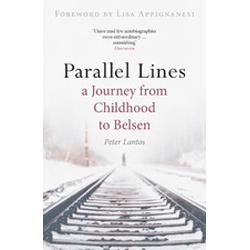 Published: 2006 (this edition 2014)
Published: 2006 (this edition 2014)
Author: Peter Lantos
A magnificent book from a remarkable man

It’s a sad but inevitable fact that the number of Holocaust survivors with us is dwindling each year. Just a week ago Alice Herz-Sommer, the subject of this year’s Oscar winning short documentary “The Lady in Number 6: Music Saved My Life” passed away at the age of 110. It is now more important than ever that as many people as possible read the testimony of survivors. Soon there will be no-one left with first hand experience of the Nazi attempt to destroy all of Europe’s Jews. I’ve been lucky enough to meet many survivors and help to record and distribute their stories. I was delighted to receive from Arcadia Books a copy of the reissued memoir by Peter Lantos, Parallel Lines.
Peter Lantos is a highly regarded doctor and neuroscientist – he is an expert on Alzheimer’s Disease and other similar illnesses. He was only a toddler, not yet five when the Holocaust reached his small town in Hungary. His first memory of the persecution that Jews faced was in early 1944 when he watched his mother sew yellow Stars of David onto family clothes. His life is irrevocably changed when his family are first moved to a ghetto, then become slave labourers and then moved onto the Bergen-Belsen concentration camp. After surviving his experiences during the war Lantos and his family face further persecution under Soviet rule.
I have read a number of memoirs of Holocaust survivors but this may be the most moving, most remarkable one I’ve picked up. The vast majority of memoirs and testimonies I’ve encountered are of survivors who sought refuge in the UK or US following their experiences. Peter Lantos returned with his mother to his pre-war home and his book, while mostly concerning experiences of Nazi persecution, also refers to the lack of freedom during Soviet occupation and his story is one which is slightly more rounded than many others I’ve read.
As a scientist Lantos is concerned with evidence and much of this book follows his journey as he tries to fill in the gaps in his memory. Much of the most hard-hitting material comes from this search including a letter from one of his liberators in the US army who recalls prisoners introducing themselves: “It seemed very important that they say their names”. Having spent so much time losing their rights as humans the first need was to reclaim identity and therefore dignity.
For most of us the figure of 6 million Jews killed is almost incomprehensible (11 million if we add the Gypsies, disabled, Black, gay, Jehovah’s Witnesses and political opponents also targeted by the Nazis). The number is almost meaningless – that’s why we need to read the individual stories, to know that the victims were people with names, families, dreams and loves. Being told that a Bergen-Belsen guard hit a woman is almost meaningless, reading that Peter’s mother was hit so hard that she couldn’t remember her five year old son affects us deeply. It’s difficult to imagine how we would react if we had been ordinary Hungarians or Germans or Austrians watching unknown Jews being rounded up but Peter’s clearest memories are of ordinary people taking risks to share news or provide a small glass of milk or slice of bread. Would we do the same?
This is one of be most beautifully written and compelling memoirs of the Holocaust that I’ve read. It’s on a par with Elie Wiesel’s Night. Parallel Lines is a truly magnificent tale of a man who faced unimaginable suffering as a child but has become someone without bitterness or anger. This is a remarkable book which needs to find as wide an audience as possible.
